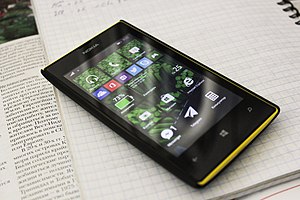Nokia Lumia 520

Nokia Lumia 520
|
|
| Manufacturer | Nokia |
|---|---|
| Slogan | "The more fun smartphone" |
| Series | Lumia |
| Compatible networks | GSM/GPRS/EDGE 850/900/1800/1900 HSPA 1900/2100 |
| Availability by country | 22 April 2013 |
| Discontinued | 2015 |
| Predecessor | Nokia Lumia 510 |
| Successor |
Nokia Lumia 525 Nokia Lumia 530 |
| Related |
Nokia Lumia 620 Nokia Lumia 720 Nokia Lumia 820 Nokia Lumia 920 |
| Type | Smartphone |
| Form factor | Slate |
| Dimensions | 119.9 mm (4.72 in) H 64 mm (2.5 in) W 9.9 mm (0.39 in) D |
| Weight | 124 g (4.4 oz) |
| Operating system |
Windows Phone 8, upgradeable to 8.1 Windows 10 Mobile insider beta, later discontinued Unofficial Android 6.0.1 port from XDA-developers |
| System on chip | Qualcomm Snapdragon S4 MSM8227 |
| CPU | 1.0 GHz dual-core Qualcomm Krait |
| GPU | Qualcomm Adreno 305 |
| Memory | 512 MB RAM |
| Storage | 8 GB Internal |
| Removable storage | 64 GB, microSD |
| Battery | 1430 mAh (stand-by time 4 days) |
| Data inputs | Multi-touch capacitive touchscreen, ambient light sensor, proximity sensor |
| Display | 4-inch IPS LCD, 480x800 resolution |
| Rear camera | 5 MP autofocus, f/2.4, autofocus 720p video |
| Connectivity |
Bluetooth 4.0 + LE (after Lumia Amber update) Assisted GPS GPS/GLONASS Micro-USB 2.0 Wi-Fi :802.11b/g/n, WiFi Hotspot Wi-Fi-based positioning system (WPS) FM Radio, Internet Radio |
| Other | Talk time (2G): up to 14.8 hours Talk time (3G): 9.6 h Stand-by time: up to 360 hours (15 days) Maximum cellular network browsing time: 6.7 h Music playback time: 61 h (2.5 days) |
| Website | www |
The Nokia Lumia 520 is an entry-level Windows Phone 8 smartphone announced by Nokia at the 2013 Mobile World Congress.
In September 2013, the Lumia 520 became the best-selling Windows device in the world, selling more units than any other model of Windows phone, PC or tablet. By July 2014, the Lumia 520 has had 12 million activations, and has played a key part for Nokia and Microsoft.
A minor successor, the Nokia Lumia 525, was later released.
The Lumia 520 comes in a slate shape with 4-inch SuperSensitive touchscreen. The viewing angles are slightly reduced compared to other phones in the Lumia line. The Lumia 520 shares the same screen resolution of 800x480 as the more expensive Lumia 620, 720 and 820, and actually has a higher pixel density than the 720. The touchscreen is designed to be sensitive enough that one can use it while wearing gloves or with fingernails.
Aside from the screen, the front of the phone contains the Windows Phone 8 standard Back, Start and Search buttons, along with a speaker. The back houses a sole 5 MP camera sensor with autofocus and two-stage capture, but no LED. The sides of the phone also have standard Windows Phone features, as required by Microsoft – volume keys, camera key, power/lock key, 3.5 mm headphone jack and micro-USB connector, which is also used for charging purposes. The phone does not have a front-facing camera or a digital compass. The Lumia 520 ships with 8 GB (8 × 230 bytes) of internal storage with about 3 GB of the storage taken up by the operating system.
The Lumia 520 has a 1430 mAh battery, which is larger than the 1300 mAh battery in the Lumia 620. The 520 is also slimmer and lighter than the 620, but at the same time longer and wider due to its bigger screen. To reduce the production costs, the 520 lacks Nokia ClearBlack display, a front-facing camera, NFC, camera flash and a compass.
The Nokia Lumia 525 launched as the successor to the Nokia Lumia 520 with nearly the same specifications and appearance. The Lumia 525 doubles the RAM from 512 MB to 1 GB, therefore making it compatible with more demanding games and apps. The back shell is also now glossy instead of matte. It is offered in black, white, orange, and yellow colors which can be swapped via removable shells.
...
Wikipedia
